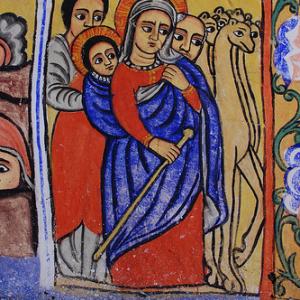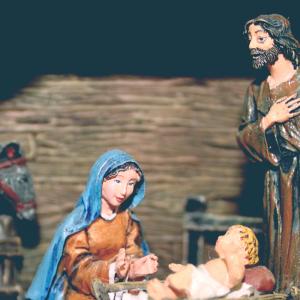
Matthew Soerens is the U.S. director of church mobilization for World Relief and is the coauthor of Welcoming the Stranger: Justice, Compassion and Truth in the Immigration Debate (InterVarsity Press, 2018).
Posts By This Author
Misquoted: Persistent Poverty
“It’s because ‘the poor will always be with you’ that we have all sorts of opportunities to practice hospitality, to practice loving strangers, to extend the sort of extravagant love that we would want to show to Jesus himself, or to a visiting angel. And don’t be surprised that someday you learn that’s exactly what you have done.”
Sermon preached at Flood Church.
A Lament for the U.S. Church’s Response to Immigrants
“God created mankind in his own image, in the image of God he created them; male and female he created them.” —Genesis 1:27 NIV
But we have too often used language that denies the truth that each immigrant — regardless of their country of origin, legal status, ethnicity, religion, or any other qualifier — is a person made in your image, with inherent dignity and potential.
No Room in the Inn for Refugees?
LAST DECEMBER, my daughter, Zipporah—who has taken to acting out the Christmas story using our wooden nativity set—observed that our crèche was missing a “mean king” figurine. That got me to thinking: I have never seen a nativity set with a King Herod figure.
We tend to close the curtains and go home for a family dinner right after the Magi bow before Jesus with their gifts of gold, frankincense, and myrrh.
But after the Magi head home, Joseph is warned in a dream to escape Herod’s genocidal tyranny by fleeing to Egypt with his wife and child.
We don’t know how the Holy Family was treated when they reached that foreign country. Were they welcomed or feared? Did Egyptians help this vulnerable family to resettle or did local carpenters fret that Joseph might steal their jobs? Was Jesus befriended by other children or viewed as a potential disease-carrier?
Compassion for the world’s estimated 21.3 million refugees—individuals who have fled their countries because of a credible fear of persecution—competes with our own fear that the violence they flee might impact us. This polarized reaction shapes the response by the United States and others to the global refugee crisis.
Nine in 10 Protestant pastors in the United States say that, as Christians, we have a biblical responsibility to care for refugees and other foreigners based on clear biblical injunctions, according to LifeWay Research. The same survey found that only 8 percent of local churches are helping refugees—nearly half acknowledged a sense of fear in their congregations regarding the arrival of refugees.
White evangelicals, by a margin of 2-to-1, were opposed to increasing the number of Syrian refugees admitted to the U.S., according to the Pew Research Center. (A majority of white mainline Protestants were also opposed and a slim majority of Catholics and black Protestants were in favor.) It’s ironic that followers of Jesus would be so afraid of refugees, given that we worship one!
Called to Radical Welcome
THROUGH MOST OF my career at World Relief, welcoming refugees has been a fairly easy “sell” to local churches: Refugees have sympathetic stories of fleeing persecution and legal status. I spent most of my energy persuading Christians that the same scripture passages that compel us to welcome refugees also apply to undocumented immigrants.
In recent years, I have observed a shift. The questions after I speak to church groups increasingly focus on Muslims. Aren’t I concerned that Muslims will “take over” America? What percentage of refugees harbor terrorist sympathies? Was I aware, one man asked, that New York City was already under sharia law? (Fact check: It’s not.)
We may have reached the point where refugees are as controversial as undocumented immigrants. Certainly, many local churches do welcome refugees—and this relational proximity has disabused many Christians of misconceptions that all refugees are Muslim (among those resettled to the U.S., more are Christians) or that Muslims immigrants want to establish sharia as U.S. law. But evangelical churches that actively welcome refugees are in the minority. A Public Religion Research Institute poll finds that 74 percent of white evangelicals believe “the values of Islam are at odds with American values”—essentially, that Muslims cannot possibly become Americans. Six in 10 white mainline Protestants and white Catholics agree.
That They May Be One: Immigration and Christian Unity
As we approach Holy Week, I’ve been re-reading the Gospel accounts of Jesus’ Last Supper, trial, crucifixion, and resurrection. In John 17, as Jesus prays for his disciples and their successors in the hours before he is arrested, he prays for our unity as his church:
…that all of them may be one, Father, just as you are in me and I am in you… May they be brought to complete unity to let the world know that you sent me and have loved them even as you have loved me. (John 17:21, 23)
Central to our mission as Christ’s followers is to share with the world this good news: that the Father sent the Son because he so loved the world — but the best observable evidence of that Gospel reality, a unified Church, seems a distant, utopian dream. Just within the United States — this small sliver of the global church — we are divided by denomination, by race, by political ideology, and by the competitive human instinct that leads even those congregations who resemble one another doctrinally, ethnically, and politically to jockey over the same individuals in order to fill their sanctuaries (or auditoriums) and offering plates. Perhaps the situation is not quite so stark: I know that many — probably most — believers share the desire for unity. It just seems at times that we have so far to go, and might be drifting in the wrong direction.
Welcoming the Stranger: Immigration and G92
Whenever possible, I plan my Saturday errands such that I’ll be able catch part of “This American Life” on public radio as I drive and I’ve often found myself sitting in the grocery store parking lot to hear the end of a story.
One recent Saturday, the show’s theme — which ties together each of its non-fiction stories — was the biblical truism that “you reap what you sow” (Galatians 6:7), and most of the program was dedicated to examining the consequences — intended and otherwise — of Alabama’s controversial, toughest-in-the-nation immigration law, HB 56, which passed last June.
Whether what is happening in Alabama as a result of this law — and, as the program reveals, a great deal is happening, even if most of us outside of the state aren’t paying attention — was the intention of the bill’s authors and supporters is not entirely clear. What is clear, from a Christian perspective, is that the effects are devastating.
What most saddened me in the program was the statement of a young undocumented woman named Gabriella that, since the passage of HB 56, she finds herself unwelcome everywhere. “Even in the church,” she says, “you find people that… don't want to talk at you. And they don't want to give the peace to you.”
Christmas Mourning

"Holy Family's flight to Ethiopia." Image via http://bit.ly/w3Z2K9
In the Incarnation, Christ brings hope to a world where, for the time being, Herod is still king, and all is not as it should be. Christmas includes the story of a terrible genocide — a traumatic refugee experience for young Jesus and his parents, and all the worse for those parents who were not warned in a dream and thus did not escape to Egypt before their infant sons were murdered — but as evangelicals we seldom reflect on this part of the story. (Catholic & Anglican Christians remember these victims on the Feast of the Holy Innocents on December 28, a practice I adopted for the first time last year.)
The great hope of Christmas, though, is that it represents the entry into history of a Prince of Peace, who will eventually dethrone Herod and Caesar and set all things right. We’re still living in that tension: Christ’s kingdom has been inaugurated but is not here in fullness yet, as the injustice of last December’s DREAM Act vote and a thousand other tragedies of poverty, conflict, and marginalization throughout our globe remind us. So Christmas is a time for mourning and for hopeful joy: and it is entirely right that Advent is a time of eager and expectant yearning. O Come, O Come, Emmanuel!
Young Evangelicals Must Champion Immigration Reform
Wanted: A Pro-Family Immigration System
A Pastor's Testimony of Redemption May End in Deportation
Pastor Walter is experiencing firsthand the effects of a broken immigration system. Walter migrated to the United States from Colombia when he was young, petitioned by his parents, who were Lawful Permanent Residents. Walter's parents wanted for their son to enjoy the opportunities that the United States had to offer.
What Happens When a Wheaton Grad Runs for Congress as a Democrat
Last weekend, as a group of religiously-committed pro-life Democrats in the House of Representatives found themselves at odds with the majority of their party over an abortion-related amendment in





